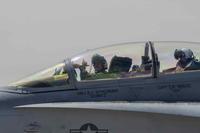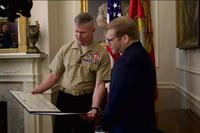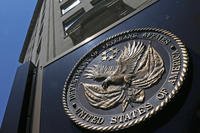...Partially, anyway. The Army isn't junking its notion of turning itself into a quicker, better networked force. But the idea that speed alone can win wars, that's finally giving way, according to Greg Jaffe's story in today's Wall Street Journal.
The Iraq attack was built on the premise that speed and high-tech equipment could radically change the way war was fought. Short, swift attacks against key targets -- such as communications stations and headquarters -- could confuse enemy forces and isolate them from their commanders, according to both Army and Defense Department doctrine. If you chopped off the enemy's head, the theory went, the whole body would die. Getting to the fight faster became the focus of modernization plans for the Army and all other U.S. armed services.
Now, the escalating insurgency in Iraq is showing that lightning assaults can quickly topple a regime -- but also unleash problems for which small, fast, high-tech U.S. forces are ill-equipped.
"We're realizing strategic victory is about a lot more than annihilating the enemy," says one senior defense official in Mr. Rumsfeld's office. Victory also requires winning the support of locals and tracking down insurgents, who can easily elude advanced surveillance technology and precision strikes. In some cases, a slower, more methodical attack, one that allows U.S. troops to stabilize one area and hold it up as an example of what is possible for the rest of the country, could produce better results, according to emerging Army thinking.
Instead, commanders are empahsizing knowledge of the local terrain and politics. "We have to start asking companies like Pepsi how it sells soda on the streets of Baghdad," Gen. William Wallace, who led the initial American attack on Baghdad, tells Jaffe. (via Today's Papers)
THERE'S MORE: In a Q&A with U.S. troops in Kuwait, Rummy apparently got chewed out by the rank-and-file.
Army Spc. Thomas Wilson, for example, of the 278th Regimental Combat Team that is comprised mainly of citizen soldiers of the Tennessee Army National Guard, asked Rumsfeld in a question-and-answer session why vehicle armor is still in short supply, nearly two years after the start of the war that ousted Iraqi President Saddam Hussein.
"Why do we soldiers have to dig through local landfills for pieces of scrap metal and compromised ballistic glass to uparmor our vehicles?" Wilson asked. A big cheer arose from the approximately 2,300 soldiers in the cavernous hangar who assembled to see and hear the secretary of defense.
AND MORE: And now, the rebuttal. "The U.S. Armys top officer reiterated his commitment to the services pricey transformation plans, despite expected strains on future defense budgets," according to Defense News.
The massive Future Combat Systems (FCS) program is the centerpiece of Army goals to become a lighter, more nimble and networked force. But the programs estimated $117 billion price tag could make it the No. 1 target in the Army budget, as various defense interests compete for what could be more limited defense dollars in coming years.
Were going to have to focus on our priorities and make sure we stay true to the course on what were doing, Gen. Peter Schoomaker said Dec. 7 during a Heritage Foundation speech in Washington.
AND MORE: Ouch. The Times has more on the debate in Kuwait. And iit is not pretty. Rumsfeld's repsonse to Spc. Wilson's armor question? "Now settle down, settle down," he said. "Hell, I'm an old man, it's early in the morning and I'm gathering my thoughts here."
AND MORE: "I would feel safer in a Volvo than I would in one of these Humvees," one soldier quips. But Reason (via Glenn Reynolds) notes that armor may not be the answer at all to these Hummer woes.
AND MORE: Did a journalist set up the whole thing? Chattanooga Times Free Press reporter Lee Pitts, embedded with the 278th Regimental Combat Team, claims that he worked with soldiers "before hand... on questions to ask Rumsfeld about the appalling lack of armor their vehicles going into combat have. While waiting for the VIP, I went and found the Sgt. in charge of the microphone for the question and answer session and made sure he knew to get my guys out of the crowd."








